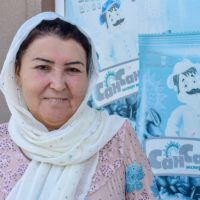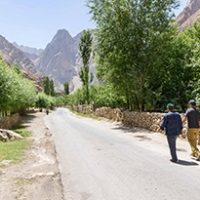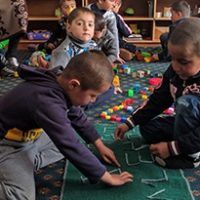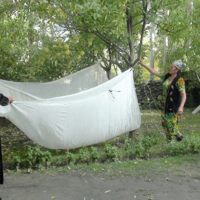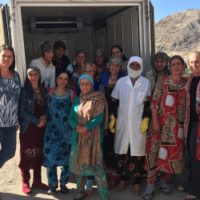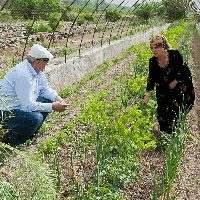Meet Rukhshod, the leader of a national micro-lending organization (MLO) in Tajikistan, with five branches across three regions. In a country where the majority of women head households, not financial entities, Rukhshod’s story underscores the importance of women’s inclusion in economic development activities.
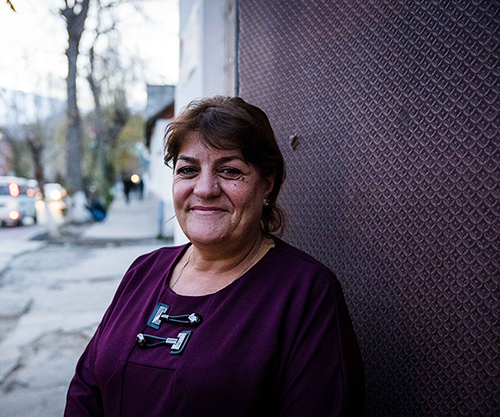
Her journey into this leadership position began when she became the manager of the women’s committee of a small village organization. Rukhshod’s natural ability to engage community members to ensure all voices were heard gained her early respect and recognition among her peers. In 2007, when a Social Union for the Development of Village Organizations (SUDVO) was formed in her area, she was selected to lead, and thrived. As a result, in 2011, Rukhshod was appointed director of MLO ‘’Rushdi Pomir.” Thanks to ESCoMIAD, a joint project of AKF and USAID, Rukhshod received training and capacity development needed to be successful in her role. Trainings included topics like business planning; financial statement analysis; and cash management. Her background in economics paved the way for her quick absorption of the material.
Over the last few years, ESCoMIAD has made significant strides in developing the capacity of staff like Rukhshod, while also strengthening MLOs to create an environment that makes financial services accessible to low-income, rural households.
What Are Micro-Lending Organizations?
In recent years, funds from village organizations like Rukhshod’s grew and civic leaders began to implement local development initiatives. In 2004, a new law in Tajikistan required that all informal lending be formalized to improve accountability—establishing the micro-lending organization, or MLO, in the country. Further regulations since then have increased the threshold base of capital required, as well as security and record keeping measures.
To ensure access to quality financial services in rural and remote areas, in 2016 AKF supported the merging of five MLOs in three regions of Tajikistan where it operates, forming one MLO “Rushdi Kuhiston.” The MLOs grew out of governance structures of the village organizations, and eventually became their own entities owned by the community as shareholders. Trainings, improved financial systems, and new loan products tailored to local needs have ensured the consolidated MLO adapts to a changing regulatory environment and economic circumstances.
In 2016, the MLO Rushdi Kuhiston’s headquarters was established in Khorog, where Rukhshod is now based as the national director. Since then, $1,500,000 in loans have been distributed, supporting household consumption and small business investments. Most noteworthy, the organization is financially sustainable, and returning dividends to the communities’ shareholders. New innovations have also been introduced: All branches are now operating with a secure, real-time connection to an integrated banking software, allowing offices as far as remote border areas near Afghanistan to record updates on new loans and repayments.
Community Rooted, Locally Owned
Like other MLOs supported by ESCoMIAD, MLO Rushdi Kuhiston takes a community-based approach to financial access. It is, in essence, a financial institution with a local face.
Rukhshod is proud to be one of those faces. Before her involvement in village organizations, Rukhshod has always been an active member of her community, even as a housewife.
“I organized events and always helped my neighbors,” she says. When she joined the village organization, she immediately was nominated to lead the women’s committee, and then promoted to lead the village organization.
To join the village organization was an easy decision. “I’m motivated by the work,” she says. “Through this, I know I am doing something good for my community.”
When asked if she has advice for young women who aspire to do similar work, Rukhshod says: “First, you have to be active—and you have to be educated.” She recommends pursuing events and workshops to build management skills. She refers to her own leadership training as critical to her success.
“You must also be prepared to serve your community,” Rukhshod adds. “Because I worked as a volunteer for a long time, almost 10 years, I worked freely and was not paid a cent.”
As a woman, she says, it could sometimes be an unfriendly environment. “To become successful, you have to be brave like men in this context. You have to be brave, and you have to be competitive,” she says. “You have to express your opinion in a public setting.”
Because Rukhshod was committed to capturing the voices of the poorest, most marginalized in the village, she had to speak up frequently.
“Most of our beneficiaries are youth and women,” she says. “Out of all our MLO clients, 31% are women.”
For the clients, the loans are critical, providing funds for core household services—such as roof repairs and heating, basic furniture and appliances, and moving costs—and even social services like education.
Improving Access for the People
To Rukhshod, it’s not about the number of loans distributed. For her, the most important thing is how many people “stood from poverty,” how many ordinary people felt supported in the absence of a traditional banking system, and how many people felt they benefitted from the loan, no matter how small the amount. The “creditworthy” clients, she says, work hard to pay back the loans that they provide.
“The most important thing,” Rukhshod stresses, “is to serve the people and to resolve people’s problems. This is the main thing, and the most important thing to my work here.”
Filling a gap in financial services, the MLOs, combined with the support of the village organizations, enhance the resilience of communities in the region.
“We have very poor people here. Our region is the poorest in Tajikistan,” Rukhshod says. “In comparison to other parts, we don’t have factories; we don’t have much opportunity. People don’t have economic opportunities. And I know they’re struggling. I was struggling before I came step-by-step into this position. And that’s why I wanted to help support them.”
By supporting local economies and local people, ESCoMIAD is expanding access to social and financial opportunities. Greater access to finance, especially, will make a sustainable difference in the lives of people in Tajikistan, like Rukhshod and her clients—helping them meet their own needs and develop their communities.
In 2014, the Aga Khan Foundation and the U.S. Agency for International Development (USAID) launched a Global Development Alliance (GDA) entitled Economic and Social Connections: A Multi-Input Area Development Financing Facility for Tajikistan (ESCoMIAD). Since then, ESCoMIAD has improved lives for people living along the Tajik border with Afghanistan.

